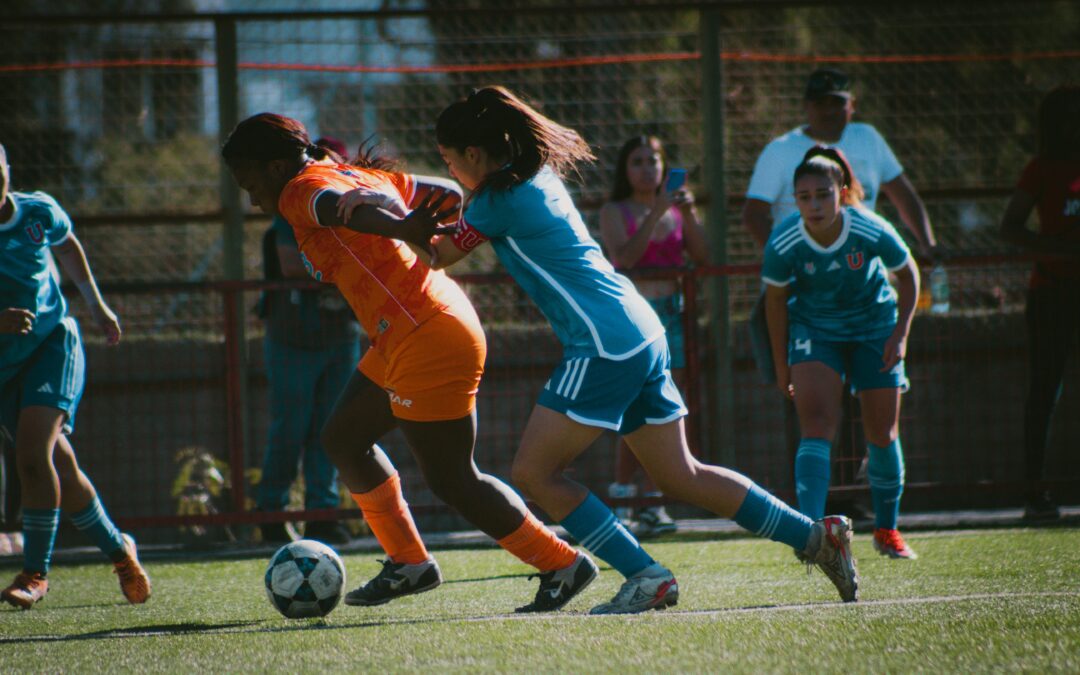It was about six minutes into our interview on Applebee’s Tailgate Talk when co-host Tim Lambert asked if I’d ever heard of Elizabeth Lambert.
“We’re not kin,” he assured me.
Elizabeth Lambert, for anyone not following women’s soccer in 2009, is the University of New Mexico player who gained national notoriety when video of her repeated fouls during a semifinal match against Brigham Young University went viral. Particularly virulent were reactions to Lambert yanking an opposing player to the ground by her ponytail.
“She could have used a bit of that ‘play on’ advice,” Lambert suggested. “No need to be pulling anyone’s hair.”
I was calling in to the Alabama radio show to discuss Play On: From Adversity to Advantage Through 140 Years of Women’s Soccer. Although the hair-pulling incident was vaguely on my radar, I’d never researched it in depth.
What I did know and shared with Lambert and his co-host Todd ‘the Bod’ Tomerlin, is that journalists and fans typically hold female athletes to higher standards of behavior on and off the field than they do male athletes and punish them more severely for the same actions.
As I share in Play On, when Dr. Jessica Vredenburg and Dr. Marilyn Giroux studied the impact of behavior on sponsorship deals, they found that while the sports world is littered with ‘lovable bad boys,’ no female equivalent exists.
Their research indicated that bad boy behavior was often associated with positive sentiments like fearlessness and intrigue, but even the slightest hint of temper or extra aggressive play in women attracts condemnation – and jeopardizes their financial support structure. “Sponsors drop women a lot quicker and for smaller transgressions,” says Giroux, a Senior Lecturer at the University of Auckland School of Business, “especially in their personal lives.”
Those transgressions may be as simple as stereotype violations, she notes. “We expect men to throw tantrums or be aggressive, but when you see more dominance or aggressiveness in women, or when they talk louder, people will penalize them a lot more than they will men.”
Women are already chronically underrepresented in endorsement deals, on average earning one-fifth of what men competing in the same sport bring in. When male athletes act up – and some of the biggest stars in male football over the past 60 years certainly have, whether by snorting cocaine, hanging out with known mafia members, assaulting teammates, attacking fans, sleeping with their teammates’ wives, or repeatedly biting other players – it doesn’t necessarily impact their popularity with fans or sponsors and might even enhance it.
In Lambert’s case, context is everything. What I have since learned is that the referee clearly let the game get out of hand and by the time he handed out yellow cards for fouls that warranted red, it was too late. Video shows the BYU player tugging on Lambert’s shorts before the ponytail incident, and another BYU player can be seen elbowing her in the stomach before Lambert shoved back. But the highlight reel only caught the reaction, not the initial action.
Lambert quickly became a pariah; after someone published her parents’ home phone number, both she and her family were subjected to abusive email messages, phone messages and media coverage. One message suggested that she should be taken to state prison, raped and left for dead in a ditch.
“I definitely feel because I am a female, it did bring about a lot more attention than if a male were to do it,” Lambert told the New York Times’ Jere Longman. “It’s more expected for men to go out there and be rough. The female, we’re still looked at as, Oh, we kick the ball around and score a goal. But it’s not. We train very hard to reach the highest level we can get to. The physical aspect has maybe increased over the years. I’m not saying it’s for the bad or it’s been too overly aggressive. It’s a game. Sports are physical.”
Lambert was suspended for two games and played just 98 minutes during the entire 2010 season, her senior year. The response to her viral video was simply too much. She disappeared from public view and so did her once-promising soccer career. This is a loss – not just because she had to abandon a game she clearly loved due to public perception, but because she was subjected to such a double standard.
It’s nice to think that the conversation might be more nuanced if this happened today. In the meantime, spare a thought for what could have been, the next time Luis Suarez bites someone.

